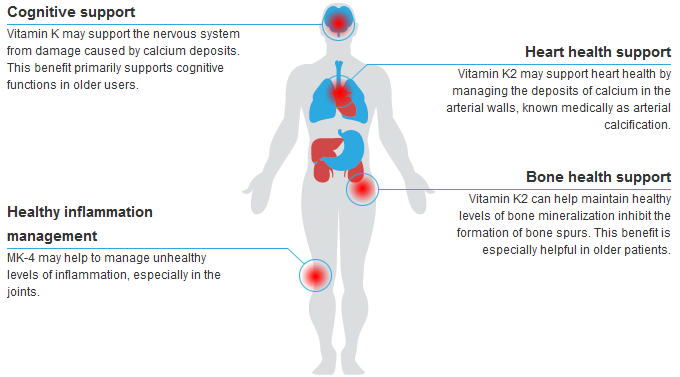Vitamin K2, particularly MK-4, offers various health benefits, including supporting cognitive function in older users by protecting the nervous system from calcium deposit damage, managing unhealthy levels of inflammation in the joints, promoting heart health by regulating arterial calcification, and maintaining healthy bone mineralization while inhibiting the formation of bone spurs.
Vitamin K2 is the common name for a group of related compounds known as menaquinones. The defining structural characteristic of a menaquinone is a quinone ring, although details such as the length of the carbon tail and number of side chains may vary. The specific name of each menaquinone indicates the number of side chains, or isoprene units, it has. For example, MK-4 is a menaquinone that has four isoprene units. The number of isoprene units primarily affects the transport of the menaquinone to the target tissue.
Menaquinones may be further classified into short-chain and long-chain members. The most nutritionally important short-chain menaquinone is MK-4, and the most significant long-chain menaquinones include MK-7, MK-8 and MK-9. The best-known role of vitamin K2 involves blood coagulation, although its full biochemical effects are more complex. For example, vitamin K2 is also a cofactor for the enzyme gamma-glutamyl carboxylase.
Vitamin K2 is produced by bacteria, so fermented foods like cheese are the most abundant dietary sources of this nutrient. Animal protein sources such as meat and eggs also contain relatively small levels of MK-4. Specific tissues in the body such as arterial walls, the pancreas, and testes can also convert vitamin K1 into MK-4.
The general benefit of vitamin K2 is to help ensure the correct disposition of calcium. This effect primarily consists of placing calcium in bones and blood rather than arteries and muscles.
NOTE: If your main objective is for arterial decalcification then best to select a product with the MK-7 version of vitamin K2 for its superior efficacy in this area.
Vitamin K may support the nervous system from damage caused by calcium deposits. This benefit primarily supports cognitive functions in older users.
MK-4 may help to manage unhealthy levels of inflammation, especially in the joints.
Vitamin K2 may support heart health by managing the deposits of calcium in the arterial walls, known medically as arterial calcification.
Vitamin K2 can help maintain healthy levels of bone mineralization inhibit the formation of bone spurs. This benefit is especially helpful in older patients.

A significant portion of vitamin K intake is the result of fermentation by intestinal bacteria, so conditions that disrupt this process can result in a deficiency of vitamin K2. Newborns and individuals on long-term antibiotic therapy may therefore benefit from vitamin K2 supplements. The most common signs of a vitamin K2 deficiency include arterial calcification and low bone density.
Menaquinone
Shipping calculated at checkout
